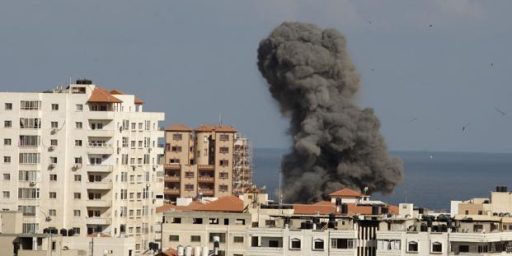Israelis Give Palestinians Control of Gaza Border
After a night of arm twisting from U.S. Secretary of State Condoleezza Rice, the Israeli government agreed to turn over control of the Gaza border to the Palestinian Authority.
Israelis, Palestinians OK Gaza Border Deal (AP)
Israel and the Palestinians have reached a deal on Gaza border crossings, Secretary of State Condoleezza Rice announced Tuesday. The agreement was reached in marathon negotiations overseen personally by Rice who stayed a day longer than planned in Jerusalem to shepherd the deal to a conclusion. Rice praised the deal at a news conference as a “big step forward” in Israeli-Palestinian relations.
Under the deal, the Gaza-Egypt border would tentatively open Nov. 25, and construction of a Gaza seaport would begin, she said. Palestinians would be able to travel between the West Bank and Gaza in bus convoys through Israel. An agreement gives the Palestinians control over a border for the first time and provides a much-needed boost to the shattered Gaza economy. It also marks an important breakthrough for the sides, who had failed to capitalize on the momentum created by the withdrawal.
It also strengthens Palestinian leader Mahmoud Abbas ahead of Jan. 25 parliament elections and help him fend off a strong challenge by the Islamic militant group Hamas.
[…]
Under the deal, Israel would allow Palestinians to move between the West Bank and Gaza, traveling in army-escorted bus convoys through Israel. International negotiators had also demanded that Israel commit to a minimum number of trucks to be able to leave Gaza every day via a cargo crossing between the coastal strip and Israel.
The Palestinians say reopening the crossings is essential to rebuilding Gaza’s shattered economy after three decades of Israeli control, especially with the harvest season approaching. Abbas has said he won’t reopen the border with Egypt without an agreement.
This is a very delicate balance. For lasting peace to be possible, the Palestinian economy needs to be much stronger and Hamas needs to become less attractive as an alternative. On the other hand, Israel is taking all of the risk here. Its security is much lessened in the short term with no obvious concessions or assurances in that regard from the Palestinians.
Robin Wright elaborates,
For the first time since 1967, the Palestinians will gain access of the borders in the areas where they live, Rice said at an unusual press conference with international envoy James Wolfensohn and European Union foreign policy chief Javier Solana just for the press traveling with Rice, but no local journalists. The target date for the opening of Rafah is Nov. 25. “The important thing here is that people have understood that there is an important balance between security on the one hand and on the other hand allowing the Palestinian people freedom of movement. The other important point is that everybody recognizes that if the Palestinians can move more freely and export their agriculture, that Gaza will be a much better place, where the institutions of democracy can begin to take hold,” Rice said.
In an important boost for the stagnant economy in Gaza, where up to 70% of the labor force is unemployed, the Israelis will permit the export of all agricultural produces from the current harvest — instead of rotting in warehouses. The number of trucks that will pass through the Karni crossing to Israel will reach 150 by year’s end and 400 by the end of next year.
[…]
An agreement could have particular impact on the stagnant Palestinian economy and on security for the Israelis, who in the negotiations are pressing for security measures to prevent extremists and weapons from moving in and out of Gaza. An agreement would also help calm the generally tense atmosphere between the sides since Israel’s withdrawal, U.S., Israeli and Palestinian, officials say.
It is not clear from the early reporting what those “measures” might be. In the narrow view, the Israeli government gives up control of its most dangerous border with no concessions and would therefore seem to be in a weakened position until and unless the economic gains on the other side are realized. One hopes there is an equally offsetting but as-of-yet unreported countermeasure.
Related:
-
Rice Urges Israel to Loosen Border Controls
Israel Completes Evacuation of Settlements
Woman Sets Self on Fire to Protest Gaza Evictions
Israel Begins Historic Gaza Withdrawal
Netanyahu Quits Over Israeli Gaza Pullout
Israeli Murders Four in Gaza Pullout Protest, Then Lynched
Palestinian Civil War?
Palestinian Woman Heading for Treatment at Israeli Hospital Caught Carrying Explosives
Israeli Aircraft Strikes Hamas Terrorists
Natan Sharansky Resigns from Israeli Cabinet
Middle East Climate Change
Sharon Closes Gaza Settlement, Starts One in West Bank
Abbas Fires Officials after Gaza Violence
Security Fences
Israel Suspends all Ties with Palestinians
Insurgents Winning in Israel
Hamas Won̢۪t Stop Terrorism
Exit Polls: Abbas Wins Palestinian Vote
Palestinian Terrorist Yasser Arafat Dies at 75
Likud Rejects Sharon̢۪s Gaza Plan
Secret Hamas Leader
Arab Responsibility
and many more





I spent the afternoon reinstalling/restoring (and yes I never back up). So I don’t have any links anymore (can’t point to the site), but the more cynical proprietor suggested, something about letting the line run out. Before setting the hook.